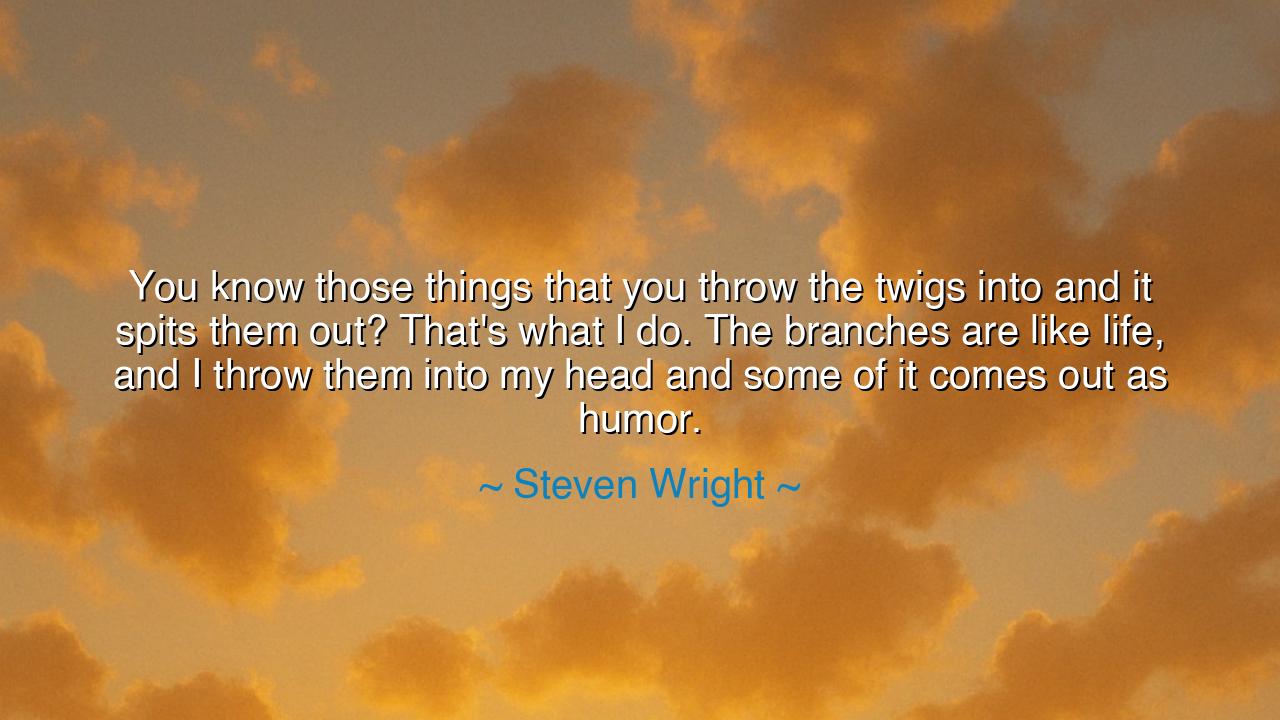
You know those things that you throw the twigs into and it spits
You know those things that you throw the twigs into and it spits them out? That's what I do. The branches are like life, and I throw them into my head and some of it comes out as humor.






In the curious and poetic words of Steven Wright, master of deadpan wit and quiet wisdom, we find an image that is both strange and profound: “You know those things that you throw the twigs into and it spits them out? That’s what I do. The branches are like life, and I throw them into my head and some of it comes out as humor.” What seems at first a whimsical metaphor is, in truth, a reflection on the nature of creativity, perception, and the alchemy of the human spirit. Wright, with his understated brilliance, speaks as a philosopher disguised in the robes of a comedian—one who sees life’s chaos, feeds it into the mill of the mind, and returns it to the world transformed into laughter.
The meaning of this quote lies in the recognition that humor is not born from nothing—it is the product of life itself, filtered through awareness. The “twigs” and “branches” represent the moments, absurdities, and contradictions that fill our days. The “machine” is the mind—complex, unpredictable, and miraculous. And what emerges from this process is humor, that sacred spark which allows humanity to find light in the midst of confusion. Wright teaches that comedy, like wisdom, begins in observation. It is the act of taking life’s raw material—pain, joy, absurdity—and refining it into something meaningful. To laugh, then, is to participate in this act of transformation.
In ancient times, the philosophers and storytellers understood this truth well. The Greek playwright Aristophanes, whose comedies made Athens roar with laughter, used wit not as mere entertainment, but as revelation. Through jokes and parody, he exposed the hypocrisy of the powerful and the follies of the crowd. His humor, like Wright’s, was not an escape from reality, but a distillation of it. The ancients believed that the one who could laugh at life could also understand it most deeply. For laughter, when born of wisdom, is a kind of clarity—the soul’s way of reconciling itself with the mystery of existence.
Steven Wright, too, embodies this ancient spirit. His humor is quiet, reflective, and surreal—a mirror held up to the absurd machinery of modern life. He takes the ordinary “branches” of human experience and feeds them into the strange mill of his mind, emerging with lines that make us laugh and think in equal measure. When he says, “I throw them into my head and some of it comes out as humor,” he is describing the creative process itself—the mysterious work of the imagination that takes chaos and renders it into art. It is no different than the sculptor who sees form in stone, or the philosopher who finds order in thought. Humor, in Wright’s world, is not decoration—it is revelation.
There is a story told of Diogenes the Cynic, the ancient philosopher who lived in a barrel and mocked the conventions of his time. When Alexander the Great approached him and asked what he might do for him, Diogenes replied, “Stand out of my sunlight.” In that moment, humor became wisdom, and defiance became art. Diogenes, like Wright, turned life itself into satire—he saw through the illusion of power and met it with laughter. His wit was a weapon of truth, forged in simplicity. The modern comedian inherits that ancient mantle, reminding us that humor, when honest, is one of the highest forms of thought.
To turn life into humor is to practice a form of resilience. The one who can laugh at life does not escape its pain, but transcends it. In Wright’s imagery, the “branches” of experience may be heavy, tangled, or sharp—but when they pass through the mind of awareness, they emerge lighter, transformed into something that uplifts both the speaker and the listener. This is the secret power of humor: it purifies experience. It allows the soul to process what is too heavy to carry raw. Laughter, then, becomes not an escape from life, but an acceptance of it—a way of saying, “Yes, life is absurd, and yet I live, and I laugh.”
So let this be the lesson: be like the craftsman of humor. Take the “branches” life gives you—its burdens, its joys, its contradictions—and feed them into the furnace of reflection. From them, let something good emerge: humor, wisdom, art, or kindness. Do not be crushed by the weight of experience; instead, transform it. For the mind, when guided by awareness, has the power to turn struggle into insight and confusion into light. Laugh deeply—not to forget, but to understand.
In the end, Steven Wright’s words are a meditation on creation itself. Every artist, every thinker, every soul that reflects upon the world performs this same miracle: they take the raw and shapeless matter of existence and give it form. The comedian turns it into laughter, the poet into verse, the philosopher into truth. The act is the same—the transformation of life into meaning. And as long as we can laugh, we prove that the human spirit endures, refining chaos into beauty, and sorrow into light.






AAdministratorAdministrator
Welcome, honored guests. Please leave a comment, we will respond soon